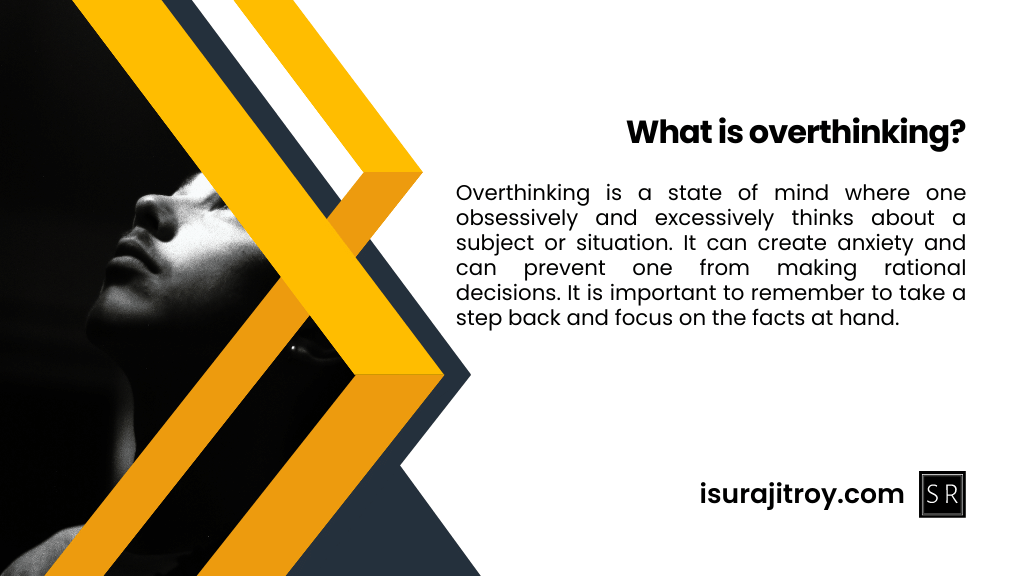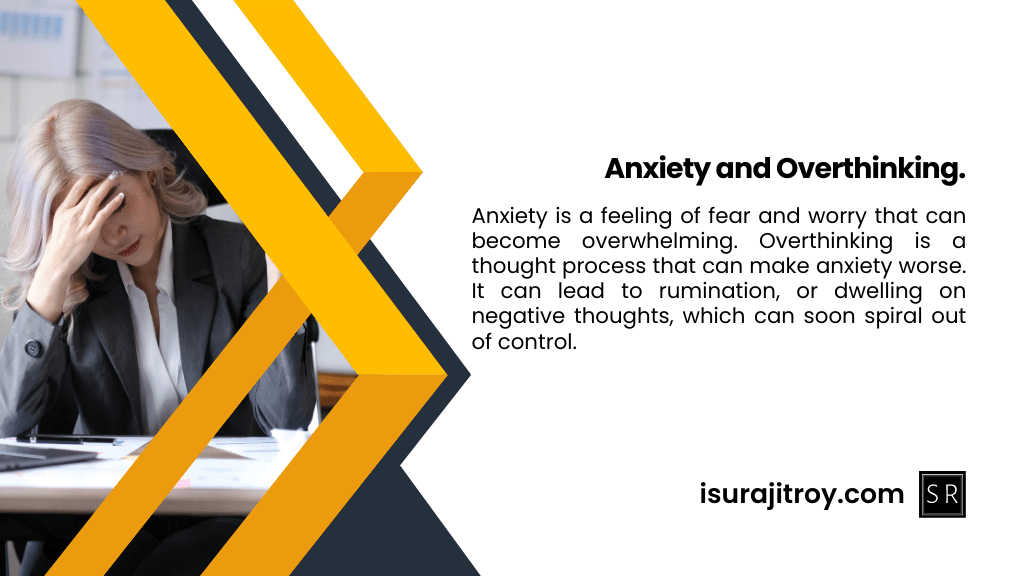
“Overthinking can limit our potential, impede our progress, and stunt our success.”
Are you someone who constantly worries and over-analyzes every decision you make? Do you experience fear of failure that leads to a paralyzing inability to move forward? If so, you may be guilty of overthinking. Overthinking can be a major hindrance to our growth and success, but there are ways to break the habit and allow yourself to reach your full potential. In this blog, we’ll discuss the causes and consequences of overthinking, as well as how to recognize and address this issue.
Overthinking often occurs when we feel overwhelmed by our current situation, or when we’re facing a difficult decision. Instead of facing the issue head-on, we get stuck in a cycle of rumination, rehashing the same thoughts over and over again. This can cause anxiety and make it difficult to move forward.
Overthinking – Definition.

Overthinking is the act of excessively thinking about an issue or situation to the point of becoming overly anxious and preoccupied. It can also be described as ruminating or obsessing, and it is often accompanied by negative emotions such as fear, worry, and anxiety.
People who are prone to overthinking often have difficulty making decisions, and this can lead to feelings of helplessness and depression. It can also lead to physical problems, such as headaches, fatigue, and digestive issues. Overthinking can interfere with a person’s ability to enjoy life, so it’s important to be aware of the signs and symptoms and to seek help if needed.
Psychology Behind Overthinking.

Overthinking is a thought pattern characterized by excessive rumination and worrying. It is often caused by an inability to let go of certain thoughts or worries, leading to a never-ending cycle of rumination. This can be caused by underlying psychological issues, such as anxiety, depression, or obsessive-compulsive disorder. It can also be caused by a lack of self-esteem or a feeling of lack of control. Overthinking can lead to physical and mental health issues, such as fatigue, insomnia, and poor concentration. It is important to seek help if you find yourself overthinking too often, in order to get to the root cause and find ways to manage it.
1. Fear of Failure: Many people who overthink do so out of fear of failure. They become overwhelmed by all the questions and solutions they can come up with, and become paralyzed by the fear of making the wrong decision.
2. Need for Control: Overthinking can be a way of trying to gain some semblance of control in situations that feel unpredictable. By ruminating on a situation, people may feel that they can gain some control over it, even if it is only an illusion.
3. Negative Thinking: Overthinking can be a form of negative thinking, as it often involves focusing on worst-case scenarios and all the potential negative outcomes. This type of thinking can become a habit, making it difficult to break out of the cycle of overthinking.
4. Past Experiences: People who overthink may be influenced by past experiences that have left them feeling anxious or insecure. For example, a traumatic experience may lead to overthinking as a way to cope with the fear and insecurity of facing a similar situation in the future.
5. Perfectionism: Perfectionists often engage in overthinking as they strive to make decisions that are “perfect” or “right”. This can lead to a cycle of constantly reevaluating decisions and worrying about potential mistakes.
Anxiety and Overthinking.

Anxiety and overthinking are two common mental health issues that can have a significant impact on your life. Anxiety can be characterized as an irrational fear or worry that can lead to physical symptoms such as sweating, trembling, or an increased heart rate. Overthinking, on the other hand, is the tendency to over-analyze situations and imagine the worst possible outcomes. It is often accompanied by a negative self-talk that can be damaging to your mental health and well-being.
Anxiety and overthinking often go hand in hand. When we are anxious, we are more likely to ruminate on our worries and fears. This can lead to a vicious cycle of anxiety and overthinking that can be difficult to break out of. In order to reduce the effects of anxiety and overthinking, it is important to practice healthy coping strategies such as mindfulness and relaxation techniques.
Mindfulness can help to reduce anxiety and overthinking by bringing your focus back to the present moment. It can help to reduce rumination and allow you to be more aware of your thoughts and feelings without attaching to them. Relaxation techniques such as deep breathing, progressive muscle relaxation, and visualization can also be helpful in reducing anxiety and overthinking.
It is also important to identify triggers that can contribute to anxiety and overthinking. These triggers can vary from person to person but may include certain people, places, memories, or situations. Once you have identified your triggers, you can take steps to avoid or minimize your exposure to them.
Finally, it is important to remember that anxiety and overthinking are common mental health issues and that you are not alone. Seek out support from family and friends, or consider speaking to a mental health professional if needed. With the right tools and strategies, it is possible to manage your anxiety and overthinking and live a happier, more fulfilled life.
Overthinking and Fear of Failure.

Fear of failure is also a common issue. It can lead to an avoidance of taking risks, or even cause us to put off making decisions. This can prevent us from reaching our goals, as we’re too afraid to try something new or take a chance.
The good news is that there are ways to overcome both overthinking and fear of failure. It’s important to recognize when you’re getting caught up in the cycle of rumination and take steps to break it. Taking deep breaths, engaging in mindful activities, and talking to a friend or family member can all help.
It’s also important to challenge negative thoughts and recognize when you’re being too hard on yourself. Remind yourself that failure is a natural part of life, and that you can learn from it.
Finally, when it comes to making decisions, it’s important to do your research and weigh up the pros and cons. Don’t let fear of failure prevent you from making progress.
With the right strategies, it’s possible to overcome both overthinking and fear of failure. Recognize when you’re getting stuck in a loop and take steps to break it. Challenge your negative thoughts, talk to someone, and make decisions based on facts. With practice, you can start to take control of your thoughts and move forward.
Fear of Failure Anxiety.

Fear of failure anxiety is a common concern among many people, particularly those who strive for perfection in their lives. It is a fear that one will not be able to meet their goals or expectations, and as a result, will not be accepted or successful. This fear can manifest in many ways, including difficulty making decisions, worrying about making mistakes, procrastinating tasks, and feeling overwhelmed.
Fear of failure can also lead to avoidance of activities or situations where failure may be likely. People may also feel ashamed of their perceived inadequacy and worry that they will be judged harshly by others if they fail. It is important to understand that fear of failure is a normal emotion and that it can be managed in a healthy way.
Some strategies for managing this fear include: setting realistic expectations, focusing on the process rather than the outcome, and developing a growth mindset which allows one to learn from mistakes and move forward. Additionally, talking to a trusted friend or therapist can be helpful in understanding and addressing the root causes of fear of failure anxiety.
How to Stop Overthinking?

1. Challenge Your Thoughts: Analyze whether your thoughts are rational or irrational, and challenge those that are irrational.
2. Engage in Activities: Doing activities that distract you from overthinking can help you to get out of your own head.
3. Take a Break: When you feel yourself slipping into an overthinking spiral, take a break and do something else.
4. Talk to Someone: Talking to someone can help to provide perspective and remind you of the bigger picture.
5. Practice Mindfulness: Mindfulness can help you to become aware of your thoughts without judgment and to be more present in the moment.
6. Follow a Routine: Having a regular routine can help you to stay focused and avoid getting lost in your thoughts.
7. Get Enough Sleep: Getting enough sleep can help you to be more alert and better able to manage your thoughts.
8. Exercise: Exercise can help to reduce stress and provide an outlet for your thoughts.
9. Write it Down: Writing down your thoughts can help you to get them out of your head and onto paper, where you can analyze them in a more objective way.
10. Practice Self-Compassion: Remind yourself that it is normal to overthink and try to be kind to yourself.
Stop Being an Overthinker.

Stop being an overthinker! Overthinking can be a difficult habit to break, but it’s worth the effort. Overthinking can be the cause of a lot of stress and anxiety and can lead to a mental health crisis if left unchecked. It can lead to fear, doubt and confusion, and can make us feel stuck in our own heads.
It can be hard to focus on the present moment and instead our minds are always wandering and ruminating on the past or worrying about the future. It can be hard to make decisions or take action, or to see beyond our own negative thoughts. It can lead to procrastination and indecision, and it can be difficult to enjoy life and to be in the moment.
The best way to stop being an overthinker is to be mindful and aware of your thoughts. Take a step back and observe your thoughts objectively, rather than getting caught up in them. Notice when you’re overthinking and make a conscious effort to stop. Try to focus on the present moment and be mindful of your environment.
Take a break from ruminating and focus your attention on something else, such as reading a book or going for a walk. Slow down and practice deep breathing to help relax and refocus your thoughts. Finally, talk to a trusted friend or family member about how you’re feeling, or even seek professional help if needed. With practice and patience, you can learn to break the overthinking habit and enjoy life to the fullest.
Conclusion
Overthinking can be damaging to our mental health and can lead to a fear of failure. If overthinking is getting in the way of you reaching your goals, it’s important to remember that failure is an important part of learning and growing. You should focus on the process of achieving your goals, rather than the end result. Acknowledge your thoughts, but don’t get stuck in them. Take steps to cope with your fear of failure and make changes in your life that will help you to be more successful. With a little effort, you can take control of your thoughts and achieve the success you desire.





